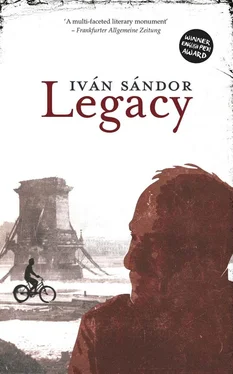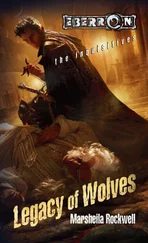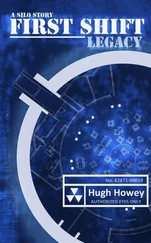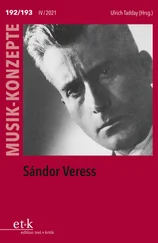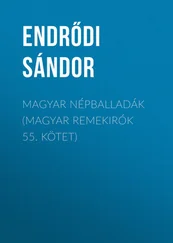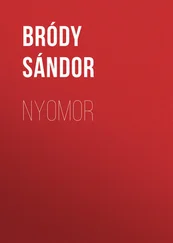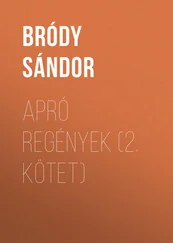He stops and rips the rag from round his head.
Father and Vera are drawing further away, but still I can see them better when I am stopped.
No, sir, you don’t look anything like one.
It’s all the same to them. If they’re in the mood they just bring out the submachine gun and pop! That’s a nice duffel coat. Are you from Transylvania? Yes, I say.
I can’t see Gizi, can’t see Father; Mother and Vera are now turning at the corner.
Nice to have met you! This is where I turn off.
Father’s steps are increasingly secure. Since we started he seems to have regained his strength. He waits for Mother and takes the haversack off her while Mother takes over Vera’s little suitcase.
Gizi is waiting for us on one of the corners. When I get there I can see there is an anti-tank gun no more than thirty metres away; around it eight to ten German solders are stamping in the cold. Their NCO is smoking a cigarette. The five of us walk on together with Gizi blowing kisses to the soldiers. The NCO salutes. One young soldier looks Vera up and down.
Gizi makes a sign, so I drop back again.
I have no idea where we are going, but maybe we have now covered about half the distance. Everyone is watching out for mortars, which are landing all round, and everyone is carrying something, whether a sack or a bag or a suitcase — some are even carrying boxes tied up with string.
Do you remember that route we took from Szabolcs Street? I ask Mother.
She reels off a list of street names. There were two air-raid warnings, she says; twice we had to go down into cellars.
I remember one air-raid shelter.
People got used to the wailing of the sirens, like bursts of submachine-gun fire or the crumps of mortars.
Collapsed walls of houses. Seeing houses in ruins.
Gizi stops again, Father as well, and he signals to Mother and Vera. If Gizi decides that we must turn back it will be my job to keep track of what is going on behind me. Perhaps she spotted an Arrow Cross patrol, maybe a patrol of Germans or regular Hungarian Army or policemen.
It only matters to us what she saw; the rest carry on as before.
A mortar hits near by.
Aircraft are coming over from the direction of Rákospalota.
Gizi beckons from a gateway. Down into the cellar, quick!
It’s like stumbling into the basement of the hospital once more. Pocket torches provide light. Women, children and some men. We press against the wall, Vera next to me, Mother hand in hand with Father. Gizi was carried further along by the jostling. It’s a good job she has a torch and can shine the light on herself.
It is rather as if we had not got this far across snowy squares and streets but along a lengthy tunnel that the sprinters, haulers, fugitives and those seeking a hiding place have cut deep underground. The yelling, the darkness and the pushing do not bother me; I have got used to it. Opening one’s mouth is not a good idea — I’ve learned that. The person next to me might be no threat, but then again they might. I still do not know precisely where we are headed, although I suppose Gizi must. According to our Swiss paperwork, Vera and I are sister and brother, and Gizi has warned Father that under no circumstances should he produce the letter if an Arrow Cross patrol, policemen or gendarme stops us to check our papers, because that letter requires us to wear a yellow star.
What am I supposed to say if we have to identify ourselves, Father asks.
That’s why I’m going first, Béla. That’s why you come behind. That’s why your son is keeping an eye out behind. To avoid anyone who might ask for our papers.
We are standing among men, pinned to the wall. I’m from Zugló. I hear this is the fourth air-raid warning since this morning. He is stand ing with his back to me, so I can’t see his face. He lists the streets where he had to take cover in air-raid shelters.
Vera wants to sit down on the concrete, but I don’t allow her. She might catch a cold and she could be trampled on if the crowd were to get going.
I said four years ago that it would come to this, says the man from Zugló. Even Napoleon came to grief. I said at the time, when that crazy painter roped us in, he was right about the Jews. Fair enough, that’s acceptable, but why did he bring this war on us? Put a sock in it, someone else says. I don’t give a shit about putting a sock in it, understand? Don’t you or anybody else tell me to put a sock in it. My son was shot before my own eyes for legging it from his company, before my own eyes, understand? Now that shut you up sharpish, didn’t it.
And I was there at the Russian breakthrough at Uriv, says someone in the corner in a dispassionate tone of voice. I got a shrapnel wound in my leg.
From the Russians?
Listen, the dispassionate tone continues, I fought up to the Don Bend, and I saw the shtetls being burned down, how every crappy little shack was looted, and that was sweet FA compared with what we’re getting now.
Stop stirring it, will you? Just be thankful the residents put up with you lot, someone shouts.
I find it impossible to tell which voice is which.
I was with a Jewish labour-service brigade. Are you a Jew? A sergeant, I was, deputy commander of a squadron. Have you any idea of the order I had to issue? No leave for anyone in the crew while a single Jew lives. The Jews did mine clearance. At least that was one useful thing they could do.
The man with his head wrapped in a rag who has been walking beside me is boring his way through the crowd, trying to get near me. You keep your trap shut it and push your way in, I hear from one of the earlier voices. Why the shush now? Got some secret to hide? And who are you anyway?
Pocket torches are switched on. A hand grabs the rag from off his head. I suppose he is around Father’s age, but he is already grey-haired. He has prominent features. Why shouldn’t I keep quiet? His voice is firm. That’s it, says the man next to him. He’s keeping very quiet, trying hard not to say anything. Who are you? What do you do for a living? I’m a physicist. What sort of physicist? A professor of physics at the university, sir, if it’s all the same to you. That’s no reason not to speak up. There isn’t anything I have to say, sir. You and your kind talk as if this was all one country; you talk as if the country had been destroyed by others, the bridges, the city; you don’t even notice that this has not been one country for ages. What, then? There you are, sir. That is why I keep quiet, or shut it, as you so quaintly term it, because I have no wish to say certain things out loud.
By now Gizi is standing next to me and tells me it is time to move on.
Again there are lots of people around us, all carrying something. One elderly woman is clasping a dachshund.
The physics professor is again pressing his way forward among us in the snow.
There is a long line standing in front of a bakery. We have no bread, so it would be a good idea to join the queue, but we have to keep going or we shall lose sight of Gizi. A woman rushes out of a house, her face bleeding. Someone shouts, and Gizi stops. Her expression is as it was when I entered her room at the Red Cross home on Mihály Munkácsy Street. She was looking similarly confused then. Father steps over to her and wants to take cover, takes the Red Cross armband off her then walks on without her. You’ve got to go, son, says the physicist.
The carcass of a horse amid the ruins, one side stripped down to the bones. A man in an army jacket, hat on head, is carrying a watering can in one hand and an axe in the other.
On the 1943 map much of the area on the Pest side of Margit Island, down as far as Ipoly Street, is not built up, with the Transport Museum on the other corner. Possibly the house where we went into the cellar may today be situated a block further north, on Gogol Street. To the best of Mother’s knowledge Gogol Street in those days was called Garam Street. She says it was in the cellar of number 38 that we took shelter. How does she remember that? Well, a classmate of hers lived at number 36; she had paid visits there. That’s what I said to Gizi when the siren went off, that we should go to the house in which Tessa lived, but number 36 had been bombed out, and everyone was running to the house next door.
Читать дальше
